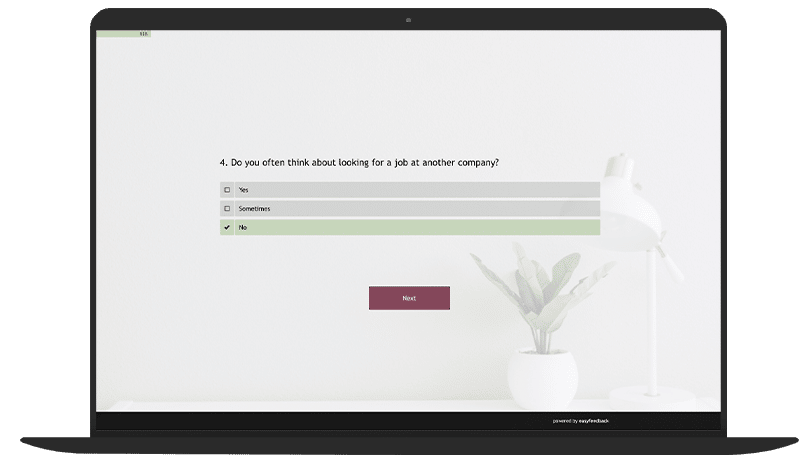Measure 1: Promoting work-life balance
The first measure that can easily increase employee retention is promoting work-life balance.
When companies allow their employees flexibility in working hours and locations, it shows that they understand and respect the needs of their employees. This leads to greater employee satisfaction and strengthens their loyalty to the company.

Furthermore, a good work-life balance can help to reduce stress and improve employee wellbeing.
If employees feel that their employer cares about their well-being, they are more likely to stay with the company.
A good work-life balance can also increase employee productivity and performance.

By having enough time for relaxation and personal interests, employees are more motivated and can concentrate better on their tasks.
Possible measures:
• Flexible working hours
• Mobile working
• Sabbatical
• Home office
• Health days
Measure 2: Offering benefits
Measure number two is to offer benefits.
Benefits such as healthcare, retirement plans, flexible working hours, home office options, training opportunities, employee discounts and other benefits show employees that the company cares about their well-being and needs.
This definitely leads to higher employee satisfaction and strengthens their loyalty to the company.
In addition, employee benefits can help employees identify with the company and feel proud to work there.
When a company offers attractive benefits, it stands out from other employers and becomes more attractive to potential new employees as well as existing employees.

Additional benefits can also help to increase employee motivation and encourage them to stay with the company in the long term.
If employees know that they are supported by their employer and have access to various additional benefits, they are more likely to remain loyal to the company.
Possible measures: • Job bike • Fruit basket • Free drinks • Subsidy for public transport • Discount cards
Measure 3: Promoting further training opportunities
Promoting further training opportunities is another measure to increase employee retention.
When companies offer their employees the opportunity to develop professionally and learn new skills, it shows that they are interested in the long-term development of their employees.
They feel valued and have the feeling that their employer is interested in their professional success.

In addition, training opportunities can help employees to identify with the company and be proud to work there.
This encourages them to remain loyal to the company in the long term.
Possible measures: • Offer internal mentoring • Offer training and educational measures • Promote knowledge transfer • Conduct regular feedback and career discussions • Create individual development plans
Measure 4: Create a positive working environment
Creating a positive working environment can also increase employee loyalty in various ways.
A positive working environment characterized by respect, openness, teamwork and appreciation helps employees feel comfortable and valued.
This in turn strengthens their loyalty to the company.

Such an environment also promotes the well-being of employees and reduces stress. When employees work in a supportive and respectful environment, they are more motivated and satisfied, which in turn helps them to remain loyal to the company.
In addition, a positive working environment can strengthen collaboration and team spirit. By supporting and encouraging each other, employees feel part of a team and are more likely to stay connected to the company.
This further contributes to increased employee productivity and performance.
In an environment where employees feel comfortable and get along well, they are more motivated to work and can concentrate better on their tasks.
Possible measures: • Clean workplace • Well-equipped workstations • Rooms for relaxation • Team events • Improve communication
Measure 5: Attractive remuneration structure
The fifth measure is a very effective one, as an attractive remuneration structure can significantly increase employee loyalty.
Appropriate and competitive remuneration shows employees that their performance and contribution to the company are valued. This can help employees feel committed to the company and motivated to stay for the long term.
In addition, an attractive compensation structure can help attract and retain qualified employees.
If a company offers competitive salaries and benefits, it is more likely to attract and retain talented professionals.

An attractive remuneration structure is also a key driver of motivation.
When employees feel that they are adequately rewarded, they are more motivated and committed to their work.
This helps to ensure that they remain loyal to the company and are actively committed to its success.
In addition, an attractive remuneration structure can increase employee satisfaction.
If employees are satisfied with their pay and receive additional benefits such as bonuses, a company pension scheme or flexible working time models, they feel valued and committed to the company.
Possible measures: • Competitive salaries and benefits • Vacation pay • Christmas bonus • Inflation compensation • Subsidies
Measure 6: Introduction of a feedback culture
Introducing a feedback culture can be instrumental in increasing employee retention as it makes employees feel heard and valued.
Here are some ways in which introducing a feedback culture can help:
1. Recognition and appreciation
Regular constructive feedback shows employees that their performance and contributions are noticed and valued. This strengthens their commitment and loyalty to the company.
2. Development opportunities
Constructive feedback gives employees insight into their strengths and weaknesses as well as clear goals for their professional development. This can help employees to stay with the company in the long term as they feel supported in their professional development.
3. Open communication
A feedback culture encourages open communication between employees and managers. This creates trust and transparency, which in turn strengthens employee loyalty to the company.
4. Improving the working environment
By giving employees the opportunity to provide regular feedback, they can also help to drive improvements in the working environment. The feeling of being able to play an active role in shaping the company contributes to employee loyalty.
5. Identification with the company
The opportunity to give and receive regular feedback enables employees to identify more strongly with the company and make a contribution to its success.
Possible measures: • Regular employee & team meetings • Use of (anonymous) surveys • Use of feedback games • Training employees in feedback techniques • Introduction of a reward system for constructive feedback
Measure 7: Promote health, sport and leisure activities
The promotion of health, sports and leisure activities is another effective measure to strengthen employee loyalty in a variety of ways.
By giving their employees access to health and leisure activities, companies can help them achieve a healthy work-life balance.
In addition, sports and health offerings help to improve employees’ physical and mental well-being, reduce stress and promote mental health.

The provision of health and leisure activities can also make a company more attractive to potential new employees.
It signals that the company cares about the wellbeing of its employees, which in turn makes it easier to retain new talent.
Overall, health, sports and leisure activities can help employees feel valued, improve their work-life balance and develop a stronger identification with the company.
This contributes significantly to increasing employee loyalty.
Possible measures: • Company sports • Nutritional advice • Vaccination campaigns • Health days • Subsidies for gyms and sports facilities • Company health management
Measure 8: Clearly defined corporate culture
The last measure I would like to introduce to you is the definition of a clear corporate culture.
Why is this so important?
A clearly defined corporate culture creates an environment in which employees can identify with the company’s values, goals and mission.
This promotes a sense of belonging and strengthens employee loyalty to the company.

A defined corporate culture sets clear guidelines and expectations, which helps employees understand what is expected of them.
This creates clarity and trust, which in turn strengthens employee loyalty.
In addition, a strong corporate culture promotes common values and behaviors that are shared by all employees.
It also actively involves employees in decision-making processes and encourages them to play an active role in shaping the corporate culture.

This helps employees to feel heard and valued.
For these and other reasons, a clearly defined corporate culture is also a suitable measure for increasing employee loyalty.
Possible measures: • Definition of practiced values • Clear & open communication about corporate values • Communicate the decision-making process transparently within the organization • Integrate values and standards into daily work processes • Involve employees in shaping the corporate culture
Conclusion: One measure alone does not increase employee retention
In this article, you have now learned about the various measures that can be taken to increase employee retention.
These strategies should not be seen as rigid instructions or a guarantee of success, but rather as a source of inspiration to strengthen the loyalty of your employees to the company.
Keep in mind, however, that no matter which measure you end up using to increase employee retention, implementing a single measure will probably not be enough or achieve the desired effect immediately.
It needs more, but it is an important start and basic building block.
It is also advisable to continuously monitor the success of a measure after it has been implemented, for example through employee surveys.
This is the only way to ensure that the measure actually offers added value for employees. Otherwise it would be worthless.
It is therefore crucial to continuously work on improving and adapting the measures in order to achieve a lasting effect on employee retention.
More on the topic of employee retention
- Why employee retention is more important than ever
- 6 methods to measure employee retention
- Employee Net Promotor Score (eNPS): measuring employee loyalty
- 6 pillars of employee retention
- The turnover rate: a key figure for measuring employee retention
- How surveys can help reduce employee turnover!
- The sickness absence rate: an indicator of employee loyalty
- How surveys can help reduce the sickness rate!
- 6 KPIs and metrics for measuring employee retention






